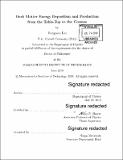Dark matter energy deposition and production from the table-top to the cosmos
Author(s)
Liu, Hongwan,Ph. D.Massachusetts Institute of Technology.
Download1134391586-MIT.pdf (39.08Mb)
Other Contributors
Massachusetts Institute of Technology. Department of Physics.
Advisor
Tracy R. Slatyer.
Terms of use
Metadata
Show full item recordAbstract
The discovery of nongravitational interactions between dark matter and the Standard Model would be an important step in unraveling the nature of dark matter. If such an interaction exists, it would have profound implications on how dark matter is produced in both the early universe and in collider experiments. In addition, it would also allow dark matter to deposit energy into Standard Model particles in unexpected ways. This thesis details some recent progress made in understanding these implications, including (i) a new freezeout mechanism for thermal dark matter dominated by a 3-to-2 process within a vector portal dark sector model; (ii) a study of how the existence of dark sector bound states can influence collider, direct and indirect searches for dark matter; (iii) a new axion dark matter interferometric search using a cavity that is sensitive to the axion-induced rotation of linearly polarized light; (iv) a definitive assessment of the potential contribution of dark matter annihilation and decay to cosmic reionization; (v) new constraints on dark matter annihilation rates and decay lifetimes from 21-cm cosmology, and (vi) a new numerical code, DarkHistory, which significantly improves the computation of the ionization and thermal histories of the universe in the presence of exotic sources of energy injection. These novel ideas span length scales ranging from table-top experiments to the entire cosmos, and represent just a few of the myriad of ways in which dark matter may yet surprise us.
Description
Thesis: Ph. D., Massachusetts Institute of Technology, Department of Physics, 2019 Cataloged from PDF version of thesis. Includes bibliographical references (pages 357-389).
Date issued
2019Department
Massachusetts Institute of Technology. Department of PhysicsPublisher
Massachusetts Institute of Technology
Keywords
Physics.